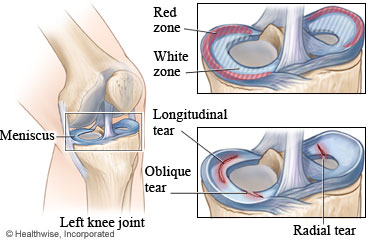
What is meniscus surgery?
Meniscus surgery removes or fixes the cartilage between the bones in the knee. This cartilage is called the meniscus. Each knee has two of these rubbery pads of cartilage, one on either side. When a meniscus tears, your knee may be painful, swell, get stiff, or lock up.
Your doctor may use small tools to remove parts of the damaged meniscus and smooth the edges. This is called a partial meniscectomy (say "men-ih-SEK-tuh-mee"). In some cases, tears in the meniscus can be sewn back together. But if your meniscus can't be repaired, the doctor may remove the damaged part.
Meniscus surgery is usually done as arthroscopic surgery. Your doctor uses a lighted tube called an arthroscope, or scope. Your doctor puts the scope and other surgical tools through small cuts in your knee. These cuts are called incisions. They leave scars that usually fade with time.
The surgery will take at least 1 hour. Most people go home the same day of the surgery. You may have to use crutches after surgery. If so, be sure you have a backpack or clothes with a lot of pockets to carry items.
You may be able to go back to school in 1 to 2 weeks. If you have a job and you sit at work, you may be able to go back in 1 to 2 weeks. But if you are on your feet at work, it may take 4 to 6 weeks. If you are very physically active in your job, it may take 3 to 6 months.
You may need physical rehabilitation (rehab) after surgery. The program may last for several months. At first, your physical therapist will work with you. Later, you will get exercises to do on your own. After surgery and rehab, you are likely to have less pain and more flexibility in your knee. How soon you can return to sports or exercise depends on how well you follow your rehab program and how well your knee heals. If you had a partial meniscectomy, you might be able to play sports in about 1 to 2 months. If you had meniscus repair, it may be 3 to 6 months before you can play sports.
How do you prepare for surgery?
Surgery can be stressful. This information will help you understand what you can expect. And it will help you safely prepare for surgery.
 Preparing for surgery
Preparing for surgery
- You may need to shower or bathe with a special soap the night before and the morning of your surgery. The soap contains chlorhexidine. It reduces the amount of bacteria on your skin that could cause an infection after surgery.
- Be sure you have someone to take you home. Anesthesia and pain medicine will make it unsafe for you to drive or get home on your own.
- Understand exactly what surgery is planned, along with the risks, benefits, and other options.
- If you take a medicine that prevents blood clots, your doctor may tell you to stop taking it before your surgery. Or your doctor may tell you to keep taking it. (These medicines include aspirin and other blood thinners.) Make sure that you understand exactly what your doctor wants you to do.
- Tell your doctor ALL the medicines, vitamins, supplements, and herbal remedies you take. Some may increase the risk of problems during your surgery. Your doctor will tell you if you should stop taking any of them before the surgery and how soon to do it.
- Make sure your doctor and the hospital have a copy of your advance directive. If you don't have one, you may want to prepare one. It lets others know your health care wishes. It's a good thing to have before any type of surgery or procedure.
What happens on the day of surgery?
-
Follow the instructions exactly about when to stop eating and drinking. If you don't, your surgery may be canceled. If your doctor told you to take your medicines on the day of surgery, take them with only a sip of water.
-
Take a bath or shower before you come in for your surgery. Do not apply lotions, perfumes, deodorants, or nail polish.
-
Do not shave the surgical site yourself.
-
Take off all jewelry and piercings. And take out contact lenses, if you wear them.
At the hospital or surgery center
-
Bring a picture ID.
-
The area for surgery is often marked to make sure there are no errors.
-
You will be kept comfortable and safe by your anesthesia provider. You won't feel pain. You will probably get medicine to relax you or make you fall asleep.
-
The surgery will take at least 1 hour.
-
Your leg may be in a leg brace to limit motion. You may need to wear a brace for 4 to 6 weeks after surgery.
When should you call your doctor?
- You have questions or concerns.
- You don't understand how to prepare for your surgery.
- You become ill before the surgery (such as fever, flu, or a cold).
- You need to reschedule or have changed your mind about having the surgery.
Where can you learn more?
Go to http://www.healthwise.net/patientEd
Enter L983 in the search box to learn more about "Meniscus Surgery for Teens: Before Your Surgery".
Current as of: July 24, 2025
Author: Ignite Healthwise, LLC Staff
Clinical Review Board
All Ignite Healthwise, LLC education is reviewed by a team that includes physicians, nurses, advanced practitioners, registered dieticians, and other healthcare professionals.

